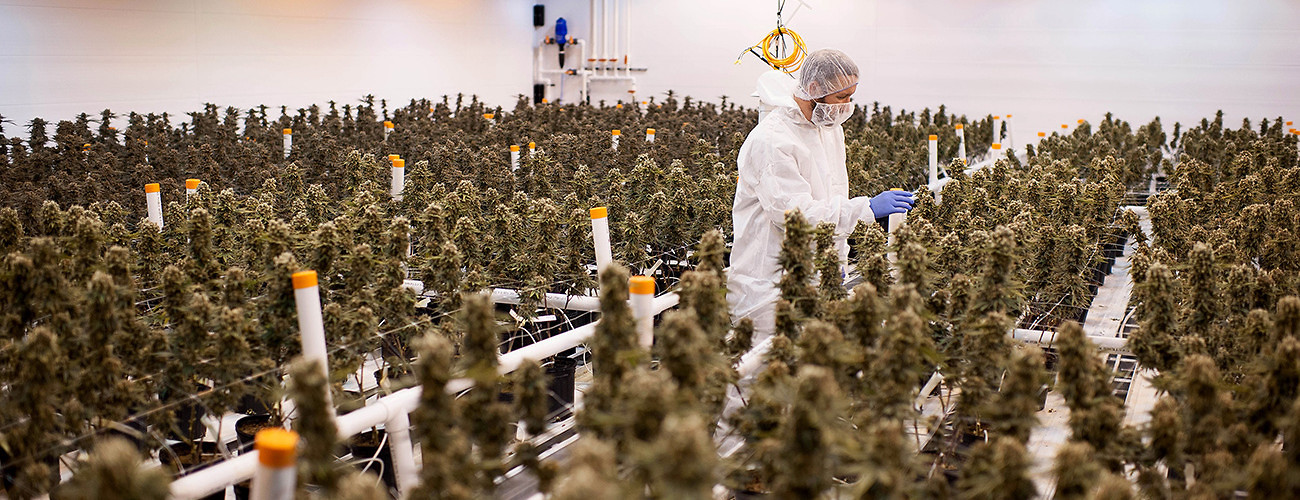An employee checks matured marijuana plants at the Tweed Inc. facility in Smith Falls. Ontario, Canada, November 11, 2015. (James MacDonald/Bloomberg/Getty Images)
The much-anticipated United Nations special session on the world drug problem—known as UNGASS—fell on its face this week. The final outcome document was hastily signed on the first day of the three-day event. It turns out to be long on rhetoric and short on substance. While offering lip service to population health and access to medicines, it is jarringly out of step with public sentiment around the world. Rather than drawing on new evidence of what works, it doubles down on the status quo.
So what is missing from the outcome document? In spite of public outcry for a change of course in global drug policy, it does not call for an end to the criminalization of users or the abolition of capital punishment for drug-related offenses. It fails to request the World Health Organization to review drug scheduling based on hard scientific evidence. It does not offer concrete recommendations to ensure treatment for users and says nothing about regulation—the surest pathway to positively reforming drug policy.
It was not supposed to be this way. The failure of the UNGASS outcome document is partly due to the flawed process by which it was conceived and prepared. There are at least four mistakes that should be fixed next time the world meets to discuss the future of global drug policy in 2019. They are not nearly as radical as they sound when considering the appalling failures of the five-decade old global drug control regime. Future negotiators would do well to take them onboard.
First, the UN’s Commission on Narcotics (CND) is probably not the most constructive entity to lead the process of genuine drug policy reform. The CND is a dated institution whose job is to safeguard the integrity of the three drug conventions established in 1961, 1971, and 1988. It is composed of 53 members—including China, Indonesia, Iran, Russia, and Sudan—who are adamantly opposed to any rebalancing of drug policy. The CND sees itself as the custodian of a hardline approach, including achieving the absurdity of a “drug free world.” It is also immune to change.
Second, any future negotiations on global drug policy must be much more open and accommodating to the diverse interests and needs of governments and societies around the world. CND members were expected to draft an outcome document that would speak to the demands of 193 member states. But the drafting process was opaque and tightly controlled, with inputs from non-members frequently discarded and left to gather dust in the so-called “parking lot.” Several governments and civil society groups expressed dismay about the process. By the time the drafting process concluded on March 23, it had already lost legitimacy.
Third, the UN Office for Drugs and Crime (UNODC) cannot be put in charge of future negotiations on drug policy. The CND appointed the UNODC to gather inputs on the final outcome document. The agency naturally promoted a criminal justice approach in various iterations of the draft declaration. This is hardly surprising—these goals are literally inscribed in its mandate. However, the inputs of other equally important UN agencies working on health, gender, human rights, and development were excluded. Future negotiations need to be significantly broadened out with a much wider range of metrics tabled for consideration.
Fourth, it is critical that civil society be given a more prominent seat at the table. During the preparations for UNGASS in 2015 and 2016, hundreds of NGOs from around the world were literally shut out from decisive meetings. Moreover, on the very day that UNGASS opened in New York on April 19, many organizations were denied entry to the UN at the last minute owing to “heightened security risks.” Astonishingly, a widely publicized open letter advocating for an end to prohibition and signed by over 1,000 political, economic, and cultural leaders was confiscated from people entering the UN by security personnel.
The UNGASS is out of step with major changes taking place around the world. The outcome document does not account for the many new and urgent drug-related threats—including synthetics. Instead, it reaffirms the international narcotics conventions as the cornerstone of international drug policy and the 2009 Political Declaration’s call for a “drug free world.” The outcome document triumphantly claims “tangible success” in the war on drugs, but there are no clear indicators measuring what this success looks like. Illicit drugs production and trafficking continues to flourish. Drug-related violence persists. Organized crime is stronger than ever.
Taken together, UNGASS is out of step with fast-changing realities on the ground. As more and more national, state, and municipal governments offer opioid substitution treatment, decriminalize consumption, and regulate drugs for medical and recreational purposes, the more they will expose the flaws of the international drug control system. The risk is that the UN–and in particular the CND–fails to adapt to changing priorities and evidence and that the multilateral approach to controlling drugs collapses altogether. In fact, it may already be too late to save the broken and fragmented international drug control regime.





